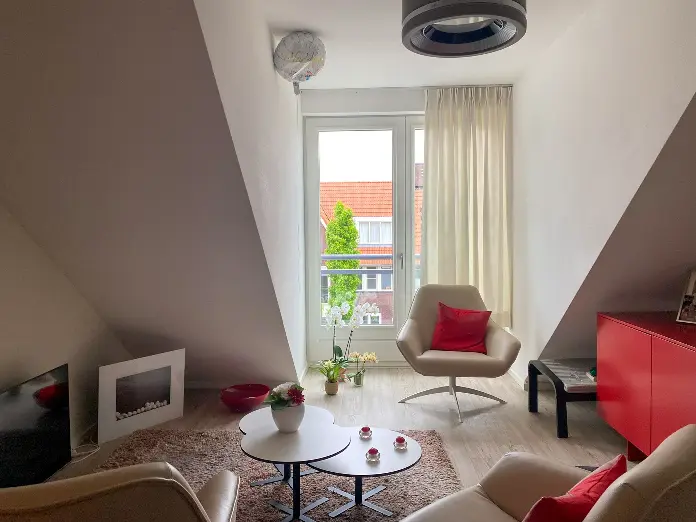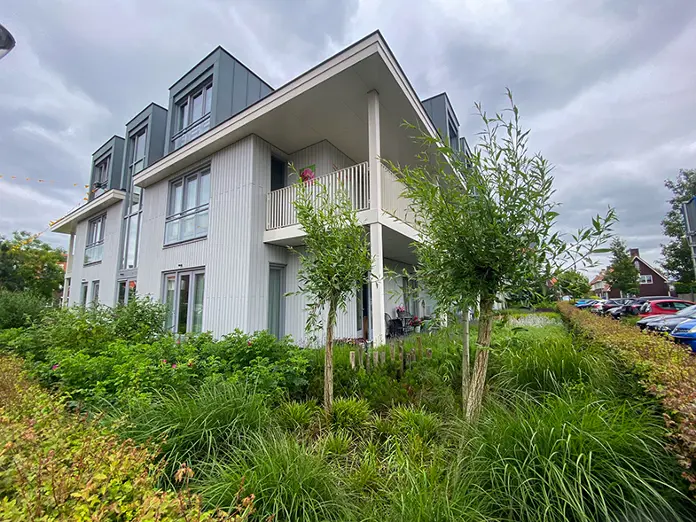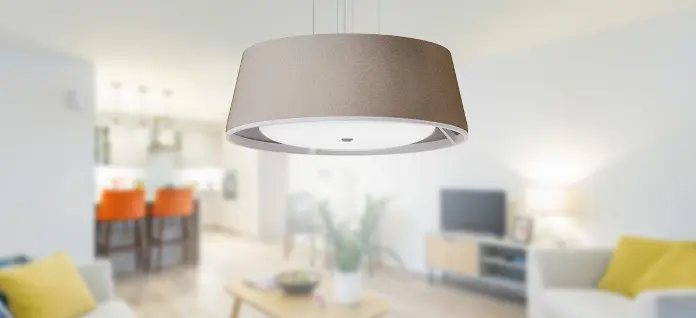In the village of Dorst, just outside Breda in the south of the Netherlands, there was once a large bell pepper farm run by the van Gool family. When son Eddy turned out to be allergic to peppers and met Marinka, they decided to go in a new direction together. On the grounds of the former nursery, they successfully established a small-scale care community called Crataegus, where technology plays an important role. We visited Crataegus and got a glimpse of what care might look like in the future.
"With us, everyone retains ownership of their
own lives, and technology helps us do that."
- Eddy van Gool, director of Crataegus
Stepping inside, it is as if we are entering a boutique hotel. A group of people, from young to old, sit together at a table enjoying coffee and pastries in warm surroundings. You don't know who the residents and who the staff are. "That's how we intended it to be. With us, everyone is equal," Eddy and Marinka tell you in chorus.
We sit down at a table farther away, but still in the middle of the action. During the interview, Eddy and Marinka will occasionally get up to talk to residents and solve small problems. "No closed office for us, even though we are the directors," Eddy says. "We are part of the whole, just like everyone else here. We also deal with everyone the same way, whether it's a neighbour, a visitor, a cleaning person or a resident.

You can tell by how we talk to each other, which is always in a casual, but also mature and respectful way. Those day-to-day, simple things are very important to us."
We sit down at a table farther away, but still in the middle of the action. During the interview, Eddy and Marinka will occasionally get up to talk to residents and solve small problems. "No closed office for us, even though we are the directors," Eddy says. "We are part of the whole, just like everyone else here. We also treat everyone the same way, whether it's a neighbour, a visitor, a cleaning staff member or a resident. You can tell by how we talk to each other, which is always in a casual, but also mature and respectful way. Those day-to-day, simple things are very important to us."
What a beautiful interior. Did you consciously think about that?
Eddy: "In our home, a few hundred meters away, we also surround ourselves with beautiful things. Why shouldn't we do that in our care community? We are made happy by flowers and this beautiful wooden table, for example. Aesthetics have an impact on us, so why shouldn't it have that on our residents and staff?"
Marinka: "People need a nice place to live and we provide that. Many organisations put their care offer at the centre and residents just have to adapt to that. With us, the resident is central."
Your residents are very diverse, also in terms of age. That also seems like a reasoned decision.
Eddy: "We don't think in target groups. We wanted to start a community that is as diverse as the village. That way residents can mean something to each other. People pay attention to each other and therefore need less care. You also see younger people walking here. That creates a very different dynamic than if you only had older people."
Marinka: "The goal is for everyone to be able to continue their lives as much as possible like home. And that means something different for everyone. Some let us know immediately that they are awake and want to go downstairs as soon as possible to have breakfast in company and join in the day's activities. Others come in here just to get the newspaper and then go back upstairs, or outside. Everyone is kind to each other, though, because everyone realises they are part of the big picture."
Eddy: "Compare it to a pub: there you also have people who linger for a long time and talk to everyone and others who have a quick pint at the bar and leave again. We are a community. Respect for each other is very important to us."
Local people are also welcome, I see.
Marinka: "Sure. Anyone is welcome to come here for a drink."
Putting residents at the centre sounds good in theory. How do you organise this in practice?
Eddy: "It's well-structured chaos here (smiles). We are practical people. If something is wrong with a toilet, we try to fix it right away. With us, those issues don't end up on a list or in a planning document."
Marinka: "We encourage self-reliance in everyone: in our residents, and also in our employees. It's about ownership. See something you can do better? Get to work on it. Coming up with your own solutions gives a lot of satisfaction. That's how everyone here takes ownership of their lives."
Eddy: "We do a lot in consultation. Everyone gets the care he or she needs, and we scale that care up or down depending on the situation. For example, our residents can go to physio with us. But we only do that if the resident wants to, if there is an intrinsic conviction. That is part of the principle of equality that we have here. Someone with an illness or disability does not coincide with that illness or disability; it is first and foremost a person."
Marinka: "We are very close to our residents. Look, there are two employees sitting at the table with the residents. Actually, they have a break, but they choose to spend that break with the residents. Because it's cosy. Why sit in a separate room? Residents are also interested in how your child is doing in school."
Eddy: "That way we get to know our residents well and find out quickly if something could be better or is going wrong. And we can also intervene quickly."
One of those employees, Desiree van Velthoven, joins us for a moment.
Desiree: "Because we find it so important to hear from our residents and clients how they prefer to live and live, we are participating in a two-year research project 'The Power of Crataegus' with Fontys University of Applied Sciences. Using design thinking, together with our residents we playfully discover how we can make Crataegus an even nicer facility. This ranges from conversations to making pictures and collages. At a later stage, we will also involve our stakeholders in the research."
Is it from that customer satisfaction that you chose Nobi's smart lights?
Eddy: "Our vision aligns perfectly with Nobi's. Thanks to the smart lights, everyone has peace of mind because we know we will be notified immediately if someone has fallen. We no longer have to do night rounds and we don't have to walk into the apartment uninvited to check if everything is ok. This, of course, fits with the fine living environment we provide. The residents are also at ease. If they fall, the voice of their light immediately tells them that help is on the way. That is priceless for their peace of mind as well as that of our staff."
Marinka: "The stylish design of the Nobi lights completely fits our design philosophy. We already told you that we like to surround ourselves with beauty. So we deliberately do not choose an ugly and stigmatising call system. Nobi's lights fit perfectly with the interior of our studios and apartments and that in a discreet way."
Would you like to learn more about the role
Nobi plays for
residents and caregivers at Crataegus?
Self-reliance, equality, a beautiful living environment ... is that the future of healthcare?
Marinka: "Just put the word sustainability there. In the ecological sense, because we are energy neutral. But also in other meanings. We encourage young people to come here to help, so that we can get them excited about a job in the healthcare sector. Because we are heading for a major labour shortage. We are also sustainable because we keep our care affordable. We look at healthcare creatively. We can provide a high-quality environment and still be cost efficient. We fall below the rent subsidy limit, low-income people are also welcome here."
Eddy: "More and more people are coming to us for inspiration. That's nice, we are very open about it. So we like to tell people about Nobi. A smart, beautiful light that detects and prevents falls: that fits our story perfectly."


